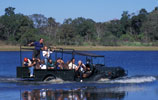Developing Ecotourism
3 min read
ECO Tourism –
The Galapagos Islands, Madagascar and Indonesia’s Sulu-Sulawesi sea. Can you imagine if these breathtaking travel destinations were lost?
Some of the most amazing places on Earth are also the most threatened. Our modern wonders, and their unique and irreplaceable wildlife, are in jeopardy. And while common knowledge may suggest we stay far away from these landscapes and seascapes to protect them, CI knows that you can help save the world’s most precious places by visiting them in a responsible manner.
GO THERE: Find out which popular destinations our ecotourism initiatives are working to protect.
“Ecotourism” is a growing source of revenue for the long-term management and care of more than 33,000 protected areas worldwide. It’s not just about driving more tourists to these locations. That’s the easy part: there are 700 million travelers in the world annually. And they generate roughly $2.4 billion dollars a day. It’s about ensuring that visitors travel responsibly, help protect the wildlife they are visiting and contribute to the well-being of local communities.
RECENT NEWS: Leading Tour Operators Consider Madagascar
Ecotourism only works when it yields economic benefits to local people, supports conservation and reduces the human impact of travel. It requires the active and educated participation of tourists and the travel industry alike, and it involves everyone from the visitor to the tour operator and airline, the hotelier and the local labor force to agriculturists to individual conservationists.
CI’s role is to bring these parties to the table in key locations to develop nature-based tourism strategies that are community-driven and conservation focused. We’ve been doing this for nearly 20 years in 18 countries around the world. The Chalalán Ecolodge in Bolivia – our joint initiative with the rainforest community of San José de Uchupiamonas since 1995 – just won the Equator Prize for outstanding achievement in poverty reduction. In Madagascar, where the government committed to triple the size of its total protected areas in 2005, we’re working directly with tourism stakeholders to ensure travel to and management of those areas brings tangible benefits to local communities while increasing the competitiveness of the destination. And with Wildlife Adventures and the UNDP’s Equator Initiative in Mozambique, we help finance the Ibo Island Lodge and support a community trust fund for micro-loans to local entrepreneurs.
TIPS FOR TRAVEL: Use our tips to stay courteous and respectful on your journey.
Your role in ecotourism – whether you travel to relax, explore or learn – is to prepare carefully before leaving and choose responsible options. Know your destination intimately: its wildlife, unique environmental stresses, ecotourism opportunities and certified participating agencies and operators. Ask for and choose these options at every stage of your trip, and vote with your dollars. Do everything you can to protect the environment around you for future generations. What you do while at your computer booking flights and hotels here can be felt on the ground and make all the difference between what’s lost and what’s saved there.
(c) ECO Tourism – Read entire story here.









